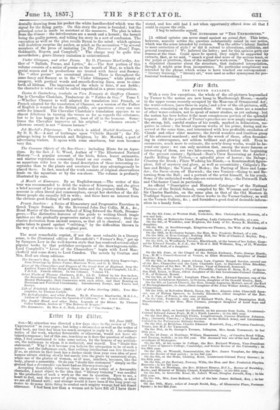tzttrr fa tbt Chitur.
9111 June 1857.
Sni—My attention was directed a few days since to the review of "The Unprotected" in your pages; but being a deesernaker as well as the writer of that book, my time has been too much occupied to reply to it. An ordinary notice of the work, whether favourable or otherwise, would not have obtained a response ; but of this one, touching as it does the question of authorship, I feel constrained to take some notice, for the honour of my publishers the nobleman to whom it is dedicated, and myself. You "doubt this statement." 'Why? is it because you believe the occupation to be of such a nature, and the influences such, that nothing intellectual can live therein ? If so, no picture in that book has a darker shade than your own idea of poor human nature sinking slowly but surely into the grave by unnatural steps, while one of the glories of woman, as of man, intellect, becomes, like the body, almost a nonentity. Or do you "doubt this statement" simply on the ground that a dressmaker can have had no literary training .? Accepting thankfully whatever there is in your notice of a favourable character, I must object to the idea that "literary training" was needful to the production of sueh a work as the one in question. Eyes to see, a heart to feel, and the power of giving utterance to our thoughts, is what we are all blessed with ; and strange would it have been if the long pent-up desire to do some little thing to combat such mighty wrongs had not found utterance. I had been less than a woman not to hare felt all I have there stated, and less still had I not when opportunity offered done all that I
could to expose the evils.
I beg to subscribe myself,
THE AUTHORESS OF "THE UNPROTECTED."
[A critical opinion can never stand against an actual fact. This letter, however, scarcely settles the question substantially raised in our notice, which was the sense intended by revision. Was the editor's labour limited to mere correction of style ? or did it extend to alterations, additions, and general treatment ? We inferred the latter ; and for this opinion gave our reasons at the time. Could space be apared, they might be supported by extracts, that, as we said, "smack agood deal more of the serious tract, or the pulpit or platform, than of the milliner's work-room." There was also a disjointed character about the structure, that indicated interpolation, though it might arise from inexperience. No particular compliment was intended by the phrase which seems to have touched our correspondent: " literary training," "literary art," were used as softer synonyines for professiomil bookmaking.]


























 Previous page
Previous page